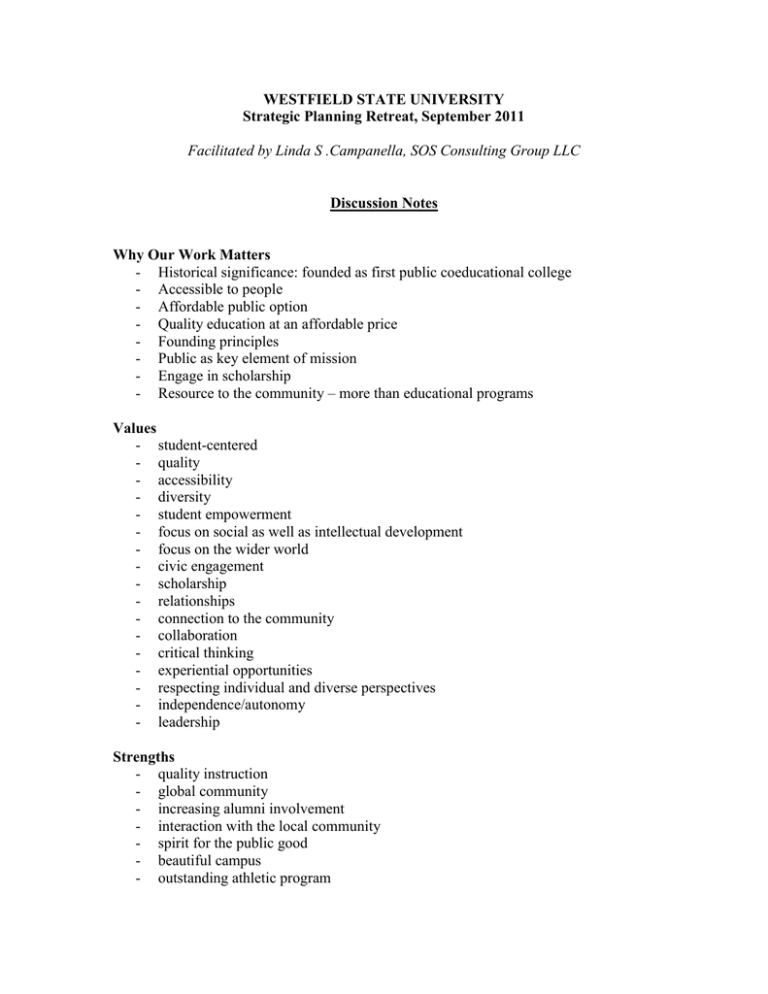WESTFIELD STATE UNIVERSITY Strategic Planning Retreat, September 2011 Discussion Notes
advertisement

WESTFIELD STATE UNIVERSITY Strategic Planning Retreat, September 2011 Facilitated by Linda S .Campanella, SOS Consulting Group LLC Discussion Notes Why Our Work Matters - Historical significance: founded as first public coeducational college - Accessible to people - Affordable public option - Quality education at an affordable price - Founding principles - Public as key element of mission - Engage in scholarship - Resource to the community – more than educational programs Values - student-centered - quality - accessibility - diversity - student empowerment - focus on social as well as intellectual development - focus on the wider world - civic engagement - scholarship - relationships - connection to the community - collaboration - critical thinking - experiential opportunities - respecting individual and diverse perspectives - independence/autonomy - leadership Strengths - quality instruction - global community - increasing alumni involvement - interaction with the local community - spirit for the public good - beautiful campus - outstanding athletic program - students student-centered historic commitment to accessible public higher education innovative academic programs supportive leadership making a difference in Western MA academic and personal support services we love our students! Truly care; a caring environment liberal arts What’s Holding Us Back? - burnout and resulting cynicism - fear: were do I fall if things change? - Contentment with status quo - Reactive vs. proactive - Contentment with existing decisionmaking methods and processes - Discomfort/fear of change - Being part of a system of individual institutions that all have their own issues to work out - State priorities may not coincide with ours - Spend a lot of time responding to directives from the Commissioner – makes it hard to be as collaborative and transparent as we’d like to be - Public’s perception of education - “Students don’t understand our mission; they want to use the school to join the elite. Our mission is fundamentally classless but we are in an increasingly classist environment.” - Struggling with education as more than just a way to get a job; we are increasingly expected to prepare students for jobs. - Social learning re: living up to our values; we don’t always. - Need more resources to thank the community in concrete ways; thank our partners - Awareness of and respecting changes in the community; changing demographics - Communication – getting info to the masses - Silos, bubbles - Are we a really a welcoming environment? Walk the walk! Ways to Promote Better Communication, Coordination, Collaboration - town meetings, open forums on focused issues - campus-wide meeting times - cross-department projects for the greater Westfield community - delegate authority; push decisionmaking down to people closer to the point of interaction with the customer - multidivisional working groups - newsletters - opening day meetings at the start of each semester - ACC could be more inclusive/representative - Senate idea - Bring back “learning communities” Strategic planning process should be inclusive Ask people what they think Build a culture of trust; create opportunities for people to talk with one another Seek feedback without fear of retribution Respect for each other and each other’s roles (both formal and informal) Weekly call-in radio show Random Ideas and Comments Recorded - Learning is not always an end result. - Different ways of learning; allow for experimentation; link content knowledge (knowledge acquisition) with experiential learning; provide a risk-free environment that inspires students to see something other/bigger than the grade as the goal; allow people to fail - University as a refuge from the digital life that envelops students; students seek and need more personal interaction. - Support student initiative: travel, forming clubs, community service - Encourage students to assemble portfolios and showcase their work; repository of evidence of the results of their initiative - Mentoring/shadowing programs; service in communities - Empower students to invent/innovate - More involvement of students in shared governance
